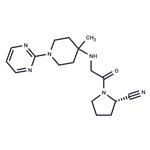K 579 is a slow-binding inhibitor of dipeptidyl peptidase IV and a long-acting hypoglycemic agent.
Dipeptidyl Peptidase IV Inhibitor IV, also known as K579 ((S)-1-[4-methyl-1-(2-pyrimidinyl)-4-piperidylamino]acetyl-2-pyrrolidinecarbonitrile), is orally available. It has a formula weight of 339.39 g/mol.
Dipeptidyl peptidase IV inhibitor. Inhibits rat, canine, human and monkey enzymes with IC 50 values of 3, 5, 8, and 8 nM respectively. Long-acting hypoglycemic agent; attenuates glucose excursion following glucose loading in Zucker fatty rats.
Dipeptidyl peptidase IV (DPP IV) is a key enzyme involved in the regulation of incretin hormone levels in the gastrointestinal tract. Incretin hormones, such as glucagon like peptide (GLP-1) and glucose-dependent insulinotropic hormone (GIP) / gastric inhibitory peptide, cause the glucose stimulated release of insulin. This allows the endocrine system to preemptively stimulate release insulin in response to ingestion of high sugar foods. Type 2 diabetics demonstrate a greatly reduced incretin induced insulin release response.This response in hyperglycemic conditions is counterbalanced by the rapid rate of degradation of these incretin hormones by dipeptidyl peptidase IV in normal conditions. Inhibition of dipeptidyl peptidase IV results in longer lifetime of the incretin hormones in the GI tract and thus prolonged stimulation of insulin production. Specific dipeptidyl peptidase inhibitors are actively being explored as drug targets for treating type 2 diabetes and several candidates are actively in clinical trial.
![(2S)-1-[[[4-METHYL-1-(2-PYRIMIDINYL)-4-PIPERIDINYL]AMINO]ACETYL]-2-PYRROLIDINECARBONITRILE Structure](/CAS/GIF/440100-64-1.gif)
